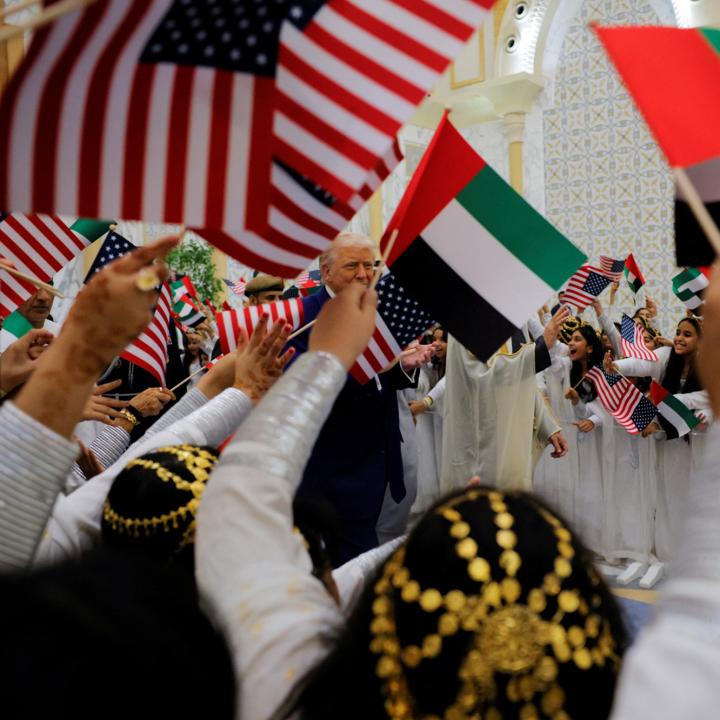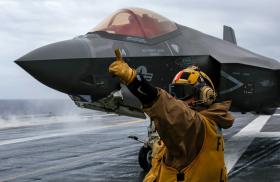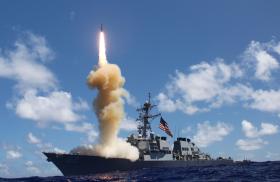
- Policy Analysis
- PolicyWatch 4062
Unpacking Trump’s 2025 Gulf Investment Tour

The president focused his first planned visit to the region on securing trillions of dollars in economic deals, but carrying these projects to completion while ensuring U.S. interests will require close, sustained oversight.
As expected, President Trump’s high-profile May 2025 tour across Saudi Arabia, Qatar, and the United Arab Emirates focused on securing a reported $2 trillion in investment deals across the three stops. The administration wasted no time in touting the deals as a breakthrough win that would drive innovation and economic advancement in the United States. Although major deals are often a key part of presidential state visits, the challenge now lies in translating these announcements into tangible results that can support U.S. interests over the long term. The deals are important to both the U.S. and Gulf economies, and can help box out American competitors like China, making meaningful progress vital to U.S. strategic influence.
The visit also highlighted a reprioritization in U.S. foreign policy—placing an emphasis on deepening key bilateral relationships through strengthening economic partnerships, most notably via investment deals between American and Gulf companies. The president’s speech at the U.S.-Saudi Investment Forum in Riyadh offered the clearest articulation yet of his second administration’s economic-forward approach to the Middle East. If carried out successfully, deeper industrial and economic engagement could reinforce the resilience of the U.S. economy, in line with statecraft utilized by previous administrations—e.g., Ronald Reagan’s promotion of global free markets to counter communism, Barack Obama’s promotion of the Trans-Pacific Partnership to rebalance U.S. influence in Asia, and others. However, with a fragile ceasefire in place between Israel and Iran, and the possibility for additional U.S. involvement—along with a looming trade war with China—the administration may be forced to balance its pursuit of economic ties with the realities of broader strategic and security priorities in the region.
Key Trip Announcements
Each stop on the tour seemed to fit a different theme: in Saudi Arabia, it was massive economic and defense investments; in Qatar, it was aviation deals and military diplomacy; and in the UAE, it was technology and artificial intelligence collaboration.
Saudi Arabia. The president’s stop in Riyadh was marked by the announcement of the kingdom’s $600 billion investment commitment to the United States. At the U.S.-Saudi Investment Forum held during the visit, the deals announced spanned multiple sectors, including energy security, defense, technology, global infrastructure, and critical minerals. Perhaps the most headline-worthy was a $142 billion U.S. arms package dubbed the largest defense sales agreement in history. Some of the other notable deals announced under the $600 billion pledge included investments in: U.S.-based AI data centers and energy infrastructure, advanced technologies, Saudi infrastructure projects, U.S. energy equipment and commercial aircraft, the U.S. healthcare supply chain, and U.S. sports industries.
Qatar. In Doha, President Trump secured agreements worth a reported $1.2 trillion that included defense sales, infrastructure investments, and a massive aviation deal, with the aim of dramatically expanding U.S.-Qatar security and economic ties. The reported investments also included projects in energy infrastructure, engineering and urban development, and emerging technologies cooperation.
UAE. In Abu Dhabi, President Trump reportedly “accelerated” the March 2025 Emirati commitment for a $1.4 trillion investment in the United States—predominantly in technology—over the next ten years, and announced another $200 billion in new commercial deals. The investments range across sectors including emerging technology, aerospace, energy infrastructure, and critical minerals. The United States and UAE also signed an AI agreement designed to build on the March 2025 investment announcement, strengthen the bilateral technology partnership, and align UAE technology regulations with those of America.
Strategic Implications
If these deals come to fruition, they could have significant economic implications for both the United States and its partner Gulf nations. For one thing, the agreements could potentially generate hundreds of thousands of U.S. jobs in the manufacturing, defense, and technology sectors, and stimulate economic growth in both America and the Gulf countries. A PwC report estimates that AI could add more than $15 trillion to the global economy by 2030, including $320 billion in the Middle East, with contributions of more than 12 percent of GDP for Saudi Arabia and 14 percent for the UAE. While the trade balance between the U.S. and Gulf countries is increasingly small compared to that with other global partners, the deals could help rebalance trade even further by increasing exports of American products and services.
Despite these reasons for optimism, the administration must account for strategic considerations as these deals proceed, with the goal of protecting U.S. national security interests. Even as these Gulf countries are prioritizing agreements with the United States, they have not exactly signaled a deprioritization of their relationships with China. Notable examples include agreements by both Riyadh and Abu Dhabi with Beijing in the last six months covering the green energy, technology, education, health, and tourism sectors.
With no clear end-state identified for these countries’ relations with China, deeper American ties will require continuous monitoring and consistent engagement. Such robust oversight is necessary for partnerships in countries with less stringent regulatory environments than the United States, which could create a backdoor opportunity for China in particular to access sensitive U.S. technology and intellectual property. In the case of the U.S.-UAE announcements on AI, reports have emerged that American officials have not even determined the security conditions necessary to export advanced chips or provide enforcement. As the United States seeks to counter China’s growing influence in the region and encourage greater regional security, an approach focused solely on transactional diplomacy could, in the long run, threaten to undermine America’s partnerships and sensitive technology.
The White House may never hit the $2 trillion figure cited during the trip—some estimates place the total value at around $730 billion—since many of the deals signed were likely already in progress during the previous administration, and others are based on nonbinding agreements. But the top-line number matters less than getting the fundamentals right to make sure these economic relationships stay on track. Implementing the projects could likewise be difficult on the U.S. side amid severe proposed cuts to personnel across key departments like State, Commerce, and Energy, which could diminish executive branch follow-through. Even more uncertain is whether the United States can deliver on commitments to arms sales given pressures on its own defense-industrial base and prioritization for competing theaters.
Effective implementation of these projects will rely on political stability in the region, Gulf success in diversifying their economies, and the generation of new revenue, but it will also be heavily shaped by U.S. domestic policies, potential cuts to government agencies, and the efficacy of the U.S. defense-industrial base. Without disciplined follow-through, both America and the Gulf countries will struggle to reap the expected economic benefits. A lack of follow-through also risks pushing these countries toward China, making successful implementation essential for advancing U.S. strategic interests.
Policy Recommendations
By taking specific steps, the Trump administration can reinforce economic integration with its Gulf partners, realize the potential of the deals inked during the president’s May visit, and still attend to urgent strategic implications for U.S. national interests:
- Appoint executive leadership for implementation. Personnel is policy. To translate the recent high-level agreements into tangible outcomes, the administration should appoint a senior empowered official with a dedicated team responsible for implementation. These are complex, multiyear business arrangements that require sustained coordination. Establishing executive leadership will signal the White House’s political commitment and ensure accountability. The individual or team should serve as a central point of contact for U.S. and foreign companies and help identify and remove U.S. government operational hurdles. The effectiveness of this role will depend on sustained resourcing and appropriate staffing.
- Structure an efficient mechanism to protect U.S. national security interests. The administration should ensure that a clear and effective mechanism is in place to advance these deals while safeguarding U.S. national security. Moving foreign investment agreements forward requires coordination across multiple agencies—including the Commerce, Defense, State, and Treasury Departments, among others. Given the complexity and duration of this oversight process, which can frustrate foreign partners, the administration must prioritize timely, coordinated reviews. Doing so will help realize the full benefits of these agreements while protecting critical national security interests.
- Empower embassies as force multipliers. To ensure follow-through and deliver meaningful outcomes, the administration must expand its devoted personnel beyond a handful of Washington-based officials. It will be critical that U.S. ambassadors and embassy teams, including commercial attachés, are fully apprised of and aligned with White House priorities. Their day-to-day presence on the ground positions them to sustain momentum, navigate challenges, and advance these agreements effectively.
The president’s trip to the Gulf can be marked as a success by any definition of the word, drawing in billions if not trillions in investment deals that—if implemented—will benefit both the United States and its Gulf partners for years to come. Yet while these agreements offer the potential for substantial economic and strategic benefits, their success will hinge on effective implementation. By establishing executive leadership, structuring a timely oversight mechanism, and empowering embassies, the United States can maximize the positive impact of these investments and ensure long-term benefits for both the American people and their Saudi, Qatari, and Emirati partners.
Elizabeth Dent is a senior fellow at The Washington Institute and former director for the Gulf and Arabian Peninsula at the Pentagon.



